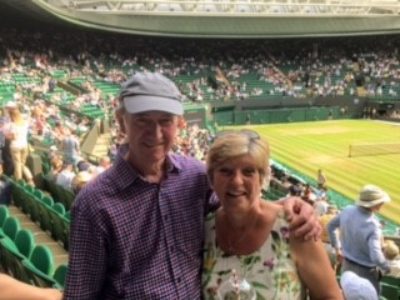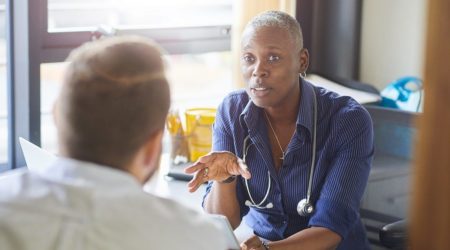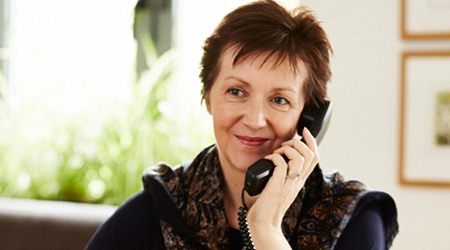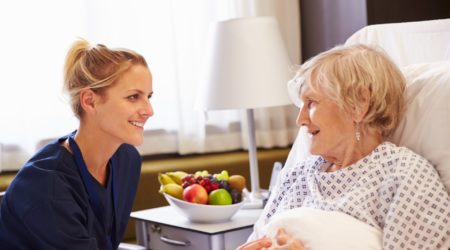



Sue & Mike
Sue tells us about her husband, Mike, who experienced some rare side effects during his treatment for pancreatic cancer. Mike passed away at home with his family around him in 2021, aged 74.
My husband Mike was a lean, fit 72-year-old. Before he was diagnosed, he was still working part time as a self-employed financial advisor, a job he had done and enjoyed for 43 years. He was an ‘outdoor man’, always up and about early in the mornings, walking our dog, often digging a ‘spit’ in the garden before breakfast.
He’d always been a keen sportsman, cycling and playing hockey to a high standard until he was 64. When he was 65 he cycled from John O’Groats to Land’s End with our youngest son, raising substantial funds for charity in the process. Mike had been a Rotarian for many years and sang in a couple of choirs. So, his life was full and much enjoyed.
We had been married for 44 years and as my retirement from a nursing career dawned, we looked forward to spending more time together, holidaying in our caravan, and generally enjoying being able to spend time in our home and garden as well as with family.
Something wasn’t right
I never knew Mike to complain of pain. I cannot remember him ever having a headache, for instance, and it was extremely rare for him to even get a cold. Two months before his diagnosis he felt very unwell, and his blood pressure was found to be dangerously high. He was treated for this, but no other tests were carried out, so he continued with life.
That summer was very hot, and Mike was putting up a greenhouse for me when he mentioned his urine was a very dark colour. I suggested he wasn’t drinking enough. But I was very worried when the next day he told me his stools were a strange colour as well. Being a nurse, I knew this could be important: I asked if they floated and was very concerned when he said yes. I knew then something was very wrong.
An appointment including blood tests resulted in a fast referral for an ultrasound scan, by which time Mike had become jaundiced. From the scan, we received the life shattering news that Mike had Pancreatic Adenocarcinoma T3 tumour in his pancreas.
Getting treated for pancreatic cancer
He had an ERCP to fit a stent. He was also started on Creon®, a pancreatic enzyme replacement, and omeprazole, an antacid.
Unfortunately, by this time his bilirubin had risen so high we had to wait for it to come down before he could have his appointment at the specialist centre, to find out if he could have surgery to remove the cancer or not.
The weeks seemed to pass with blood tests and appointments. We had to travel for an hour and a half to get to the hospital, so for 7.30am appointments we had very early starts! Each investigation led us to hope Mike would be able to have the all-important Whipple’s operation, which would give him the only opportunity of some sort of ‘recovery’ from this dreadful disease. All we wanted was for the operation to be done.
Eventually the day arrived for surgical investigation which would be the deciding factor on whether he could have the Whipple’s. Arriving at 7am, Mike was told he was first on the list; we were excited but anxious at the same time. Having met the surgeon, we had every confidence in him.
As the morning wore on it became obvious something was amiss. The air conditioning unit in the operating theatre had broken, so we waited and waited for that to be fixed. Then, the theatre was required for an emergency, so we had to go home, very disappointed and with the possibility of waiting another 2 weeks! It was my birthday that day and the worst one ever.
The day of the operation to remove the cancer
Luckily, Mike was able to go back the following week and then we had a date for the Whipple’s operation, 9 weeks after his diagnosis.
As the hospital was so far from us we decided to stay the night before in a hotel nearby, especially as I was going to spend a few nights there. On the operation day, we arrived in the unit at 7.15am. From then on time passed quickly as they prepared Mike for surgery. I’m not sure what we talked about but Mike was philosophical about the situation. He went into surgery, so I just had to wait.
My sister joined me for the day. We walked around the city stopping for refreshments, me constantly thinking of Mike. My younger son arrived later that day to spend the next couple of days with me. Later that night, as we were having our meal, the consultant phoned me to say Mike had come through the operation and was going to recovery. That was eleven and a half hours after he went into theatre.
Recovering from Whipple’s
The following day we visited Mike in the intensive care unit. Imagine our surprise to see him sitting out of bed! He had tubes and wires from every possible place, it seemed. He was in good physical shape before the operation and this stood him in good stead. He was moved to the gastrointestinal ward that same day and each day he made some progress.
Being an outdoors man, he was ‘champing at the bit’ to go outside and some days we had a wander outside or to the café. The last hurdle to going home was the drainage bag, which did not seem to want to stop flowing. Eventually it did and Mike was discharged 17 days after his operation, which was sooner than we had hoped for.
The recovery from surgery took longer than Mike had envisaged. It was most noticeable about 6 weeks after his operation, when we had a couple of days away at a hotel in Cornwall. Mike was very limited in what he could do on that holiday. He did have a little swim in the pool, but his walking was limited. From that point on though, his physical condition really improved.
Mike’s chemotherapy caused a rare side effect
Unfortunately, some of Mike’s lymph glands had cancer cells in them, and chemotherapy was recommended anyway as an extra precaution. In his typical way Mike accepted this and a dual treatment of Gemcitabine and Capecitabine, called ‘GemCap’, was started.
He had his first dose of what should have been 18 doses of chemotherapy. He didn’t get the expected diarrhoea and sickness side effects, but he developed a most alarming redness of his skin, resulting in him having to go to hospital.
For the second dose a lower amount was given, but even this increased the redness and his skin blistered over his whole body and caused him pain. The hospital team was at a loss as they had never seen any response like it. It is incredibly rare; they said only 1 in 100,000 people were expected to respond like that. So, the treatment was stopped. There was a sense of relief as well as anxiety of course.
Enjoying the good things in life together
Soon, Mike’s energy levels returned and he was cycling, enjoying daily walks, work, and Rotary meetings and choir. Life seemed good and we enjoyed holidays including a cycling holiday.
Mike loved his bikes, including motorbikes. He owned a 1948 Ariel. I arrived home one day to an unusually excited husband who had seen a Triumph Bonneville for sale. I encouraged him to buy it and it gave him great joy, despite the fact Covid struck the UK and lockdown started a week or two later. We made the most of the imposed time at home gardening, Mike did an occasional cycle ride as his daily exercise and some DIY. We joked the garden had never been so well-tended!
About a year after the operation, tests showed that Mike’s CA19.9 levels had begun to rise, and a scan showed the cancer had spread to his liver. This was obviously a great disappointment but by this time we realised this was expected and we both felt blessed to have this time together. Mike wasn’t someone who looked back or too far forward but he made the most of every day.
Mike was confirmed at Wells Cathedral in November 2019 and that same weekend we had the wonderful news that our son and his wife were expecting their first child. Life seemed so good.
Having more treatments
We continued with reviews and Mike was offered more chemotherapy, but a different one to try and avoid the same side effects again. Unfortunately, Mike reacted to it in a similar way and although his symptoms were not as severe treatment was stopped again.
Just after lockdown started, Mike developed diarrhoea which persisted for the rest of his life. We actively sought all sorts of advice and treatment, but sadly none of it eased the problem. Of course, this meant he started to lose weight and look unwell. Diet became a major daily problem as he needed everything fortified and used high nutrition drinks. Due to Covid, Mike had to attend appointments by himself or had phone consultations.
We managed to have a holiday in the September, taking our caravan only a few miles away. But it was a break and it was our last holiday together.
Not long after, Mike had another scan which showed further growths in his liver. He was offered another type of chemotherapy and despite the odds of success being very low, he decided to give it a try.
Unfortunately, after the first dose he developed a high temperature. He really didn’t want to go back to hospital again, but after much persuasion he did, and it was good that he did because he was so unwell he stayed there for 8 days. Because of Covid, I couldn’t be with him. It was very difficult but some days I would go just to wave to him through the window.
Caring for Mike at home
When he came out of hospital again he was not at all well, but he was relieved to be home.
From that point everything seemed to happen full speed, from district nurses delivering medication, to the hospice nurse and occupational therapist arranging a hospital bed and other equipment for our home.
Over the next 7 weeks, I nursed Mike at home with carers visiting twice daily to help with sheet changing and to sit with him when I walked our dog. Mike was very private, and I wanted to do all his care.
Interestingly and thankfully, he had no pain, although I was giving him occasional oromorph for some anxiety, as recommended. I slept on the sofa to be near him. He was so worried it wasn’t comfortable for me, but I wouldn’t have it any other way.
Our family stayed with us on and off and having them with us, talking about a new home they were buying, was a great distraction. We also spent time on practical things: Mike had always dealt with our finances and so on, and we spent those weeks not only reminiscing about our life together but with him giving me a fast track lesson on just about everything!
We were thankful to be with him at the end
We were thrilled to meet our grandson, Oliver, and formed a ‘bubble’ with the family. That helped a great deal. Mike was so sad that he wouldn’t be a part of Oliver’s life in the future. In his last couple of weeks Mike dictated a letter which I wrote for him, and he signed as best he could. He decided to leave silver cuff links and a watch to Oliver to be given to him when he’s older.
The family were with us for Easter when suddenly Mike complained of back pain in a most uncharacteristic way, which made me call the district nurse immediately. He was given pain relief over the next two nights, and Mike died peacefully in his sleep. I was so pleased my family were able to be with us, allowing us all to say our final goodbye.
I got support from Pancreatic Cancer UK and family & friends
During the time between diagnosis and treatment, I trawled the internet to find out as much as I could about different treatments and advice. This was when I came upon PCUK.
I immediately phoned the Support Line and spoke with Dianne. Her calm and reassuring voice made such a difference, just knowing I had someone to talk to on my bleakest days. Dianne was and continues to be someone I can talk to should I need to.
A year on from Mike’s death I’m organising a Celebration of Mike’s life. Because of Covid, we were limited to only a few of us at his funeral, so I feel this will be helpful to us as a family. Selling his bikes has been difficult, and I was so pleased our younger son inherited his vintage motorbike and one of his cycles.
I have used this past year to raise awareness about the symptoms of pancreatic cancer, and gave our local GP surgery PCUK posters and information to give to others who might be in this situation. I’ve also been raising funds for PCUK, especially during November (pancreatic cancer awareness month). That has given me something to focus on as I realise it is a charity in great need of funds for support and research.
Life will never be the same for me, obviously, and I have good and bad days. I still talk to Mike, especially if things aren’t going well or if I can’t find something! I try to carry on life as he wanted me to. I am also blessed with a wonderful network of family and friends.
May 2022




